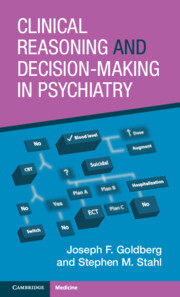68 results
7 - Hypothesis-Testing and Crafting Patient-Specific Decision Trees
-
- Book:
- Clinical Reasoning and Decision-Making in Psychiatry
- Published online:
- 25 March 2024
- Print publication:
- 18 April 2024, pp 177-208
-
- Chapter
- Export citation
2 - The Approach to Diagnostic Ambiguity
-
- Book:
- Clinical Reasoning and Decision-Making in Psychiatry
- Published online:
- 25 March 2024
- Print publication:
- 18 April 2024, pp 26-51
-
- Chapter
- Export citation
Contents
-
- Book:
- Clinical Reasoning and Decision-Making in Psychiatry
- Published online:
- 25 March 2024
- Print publication:
- 18 April 2024, pp vii-viii
-
- Chapter
- Export citation
10 - Prioritizing the Components of Any Decision-Making Model
-
- Book:
- Clinical Reasoning and Decision-Making in Psychiatry
- Published online:
- 25 March 2024
- Print publication:
- 18 April 2024, pp 276-307
-
- Chapter
- Export citation
Preface
-
- Book:
- Clinical Reasoning and Decision-Making in Psychiatry
- Published online:
- 25 March 2024
- Print publication:
- 18 April 2024, pp xi-xiv
-
- Chapter
- Export citation
4 - Shared Decision-Making
-
- Book:
- Clinical Reasoning and Decision-Making in Psychiatry
- Published online:
- 25 March 2024
- Print publication:
- 18 April 2024, pp 80-111
-
- Chapter
- Export citation
1 - Making Sense of the Senseless: How to Gather and Organize Pertinent Information
-
- Book:
- Clinical Reasoning and Decision-Making in Psychiatry
- Published online:
- 25 March 2024
- Print publication:
- 18 April 2024, pp 1-25
-
- Chapter
- Export citation
Index
-
- Book:
- Clinical Reasoning and Decision-Making in Psychiatry
- Published online:
- 25 March 2024
- Print publication:
- 18 April 2024, pp 308-316
-
- Chapter
- Export citation
5 - Deciding on Appropriate Treatment Modalities: Medication, Psychotherapy, Hospitalization, and Other Levels of Care
-
- Book:
- Clinical Reasoning and Decision-Making in Psychiatry
- Published online:
- 25 March 2024
- Print publication:
- 18 April 2024, pp 112-144
-
- Chapter
- Export citation
9 - Hierarchical and Complex Pharmacotherapy Decision-Making
-
- Book:
- Clinical Reasoning and Decision-Making in Psychiatry
- Published online:
- 25 March 2024
- Print publication:
- 18 April 2024, pp 242-275
-
- Chapter
- Export citation
3 - What the Patient Isn’t Telling You: When Seeing Is Not Believing
-
- Book:
- Clinical Reasoning and Decision-Making in Psychiatry
- Published online:
- 25 March 2024
- Print publication:
- 18 April 2024, pp 52-79
-
- Chapter
- Export citation
Copyright page
-
- Book:
- Clinical Reasoning and Decision-Making in Psychiatry
- Published online:
- 25 March 2024
- Print publication:
- 18 April 2024, pp vi-vi
-
- Chapter
- Export citation
Reviews
-
- Book:
- Clinical Reasoning and Decision-Making in Psychiatry
- Published online:
- 25 March 2024
- Print publication:
- 18 April 2024, pp ii-iv
-
- Chapter
- Export citation
6 - Measurement-Based Care and Applying Statistical Concepts to the Individual Patient
-
- Book:
- Clinical Reasoning and Decision-Making in Psychiatry
- Published online:
- 25 March 2024
- Print publication:
- 18 April 2024, pp 145-176
-
- Chapter
- Export citation
8 - Decision Points in Iterative Pharmacotherapy
-
- Book:
- Clinical Reasoning and Decision-Making in Psychiatry
- Published online:
- 25 March 2024
- Print publication:
- 18 April 2024, pp 209-241
-
- Chapter
- Export citation
Foreword
-
- Book:
- Clinical Reasoning and Decision-Making in Psychiatry
- Published online:
- 25 March 2024
- Print publication:
- 18 April 2024, pp ix-x
-
- Chapter
- Export citation

Clinical Reasoning and Decision-Making in Psychiatry
-
- Published online:
- 25 March 2024
- Print publication:
- 18 April 2024
Major depression is a serious and potentially fatal brain syndrome requiring pharmacotherapy or neuromodulation, and psychotherapy
-
- Journal:
- Psychological Medicine / Volume 52 / Issue 8 / June 2022
- Published online by Cambridge University Press:
- 03 May 2022, pp. 1423-1425
-
- Article
- Export citation
Preface
-
- Book:
- Practical Psychopharmacology
- Published online:
- 19 October 2021
- Print publication:
- 29 April 2021, pp xi-xiii
-
- Chapter
- Export citation
Foreword
-
- Book:
- Practical Psychopharmacology
- Published online:
- 19 October 2021
- Print publication:
- 29 April 2021, pp ix-x
-
- Chapter
- Export citation



